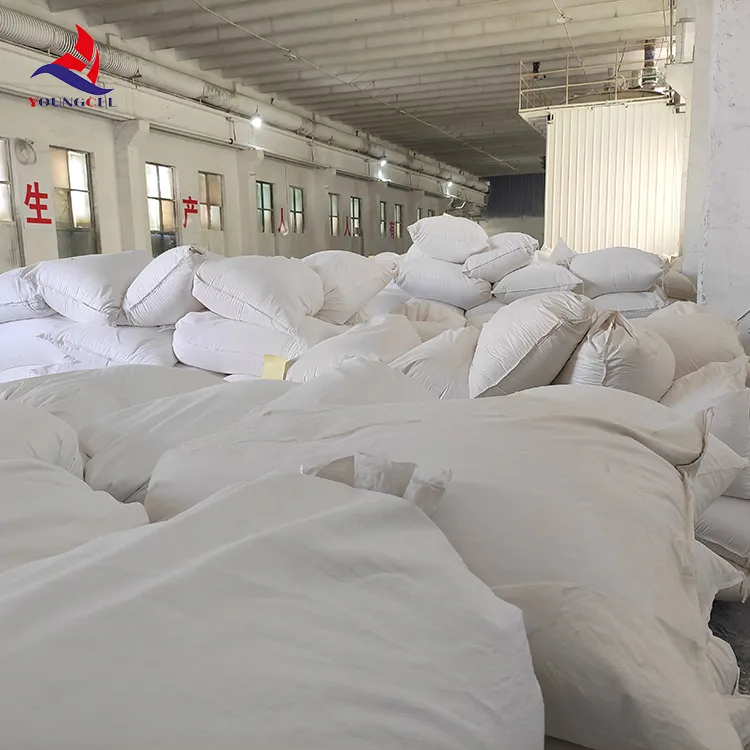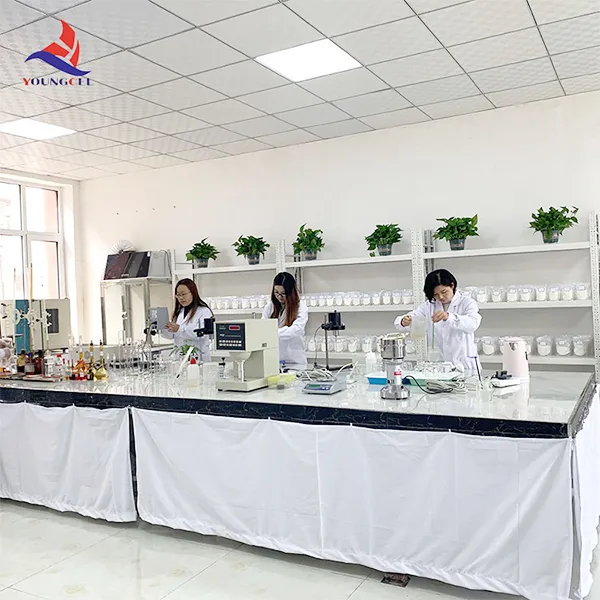- Introduction to the PVA Factory: Market Scale and Major Drivers
- Technical Advantages of Modern RDP and HPMC Factories
- Comparing PVA, RDP, and HPMC Factories: A Data-Driven Analysis
- Customized Solutions from Leading Manufacturers
- Versatile Applications of PVA, RDP, and HPMC in Industry
- Case Studies: Real-World Successes in Product Integration
- Future Outlook and Key Takeaways for PVA Factory Stakeholders

(pva factory)
Introduction to the Global PVA Factory Landscape
PVA factory operations have become pivotal in advanced chemical manufacturing worldwide. Polyvinyl alcohol (PVA), renowned for its excellent film-forming, emulsifying, and adhesive properties, is experiencing a consistent rise in global demand. In 2022, the global PVA market was valued at USD 4.7 billion and is projected to reach USD 6.22 billion by 2027, growing at a CAGR of 5.7% (Source: MarketsandMarkets). Major drivers are rapid growth in construction, textiles, and packaging sectors; as these industries accelerate, the need for specialized materials rises in parallel. Leading regions, such as Asia-Pacific, are responsible for nearly 54% of global PVA production, with China and Japan at the forefront—together accounting for more than 60% of total output. This surge is congruent with the mature infrastructure and escalating demand for sustainable, water-soluble polymers favored for their low toxicity and biodegradability. Thus, choosing the right factory for production contracts is more critical than ever, as quality parameters and supply chain efficiency differ greatly across providers.
Technical Superiority in RDP and HPMC Factories
Redispersible polymer powder (RDP) and hydroxypropyl methylcellulose (HPMC) play vital roles as functional additives in construction, adhesives, paints, and coatings. Modern factories specializing in these polymers provide substantial technical edge—thanks to advanced spray-drying technology, precise particle engineering, and rigorous quality assurance protocols. For instance, RDP manufacturers are now equipped with continuous automated lines that achieve moisture contents under 1.0% and particle sizes averaging less than 80 microns. These features promote superior redispersion, higher mechanical strength in end products, and consistent batch performance.
Similarly, HPMC produced in cutting-edge facilities is characterized by tightly controlled viscosity ranges (from 400 mPa.s to 200,000 mPa.s), high purity, and uniform substitution levels. Enhanced methods for cellulose ether extraction and purification allow for stable thermal gelation points and tailored solubility profiles—critical in construction mortars, where workability and open time directly impact labor productivity and long-term durability. Data from industry audits indicate that factories investing in vertical integration experience up to 22% fewer product recalls and achieve 99.7% batch consistency rates, vastly outperforming non-integrated competitors.
Comparing PVA, RDP, and HPMC Factories: A Data-Driven Analysis
It becomes imperative for procurement professionals and R&D teams to evaluate manufacturers based on process capabilities, product quality, and economic efficiency. The table below offers a snapshot comparison among typical pva factory
, rdp factory, and hpmc factory price structures and core metrics:
| Parameter | PVA Factory | RDP Factory | HPMC Factory |
|---|---|---|---|
| Annual Output (MT) | 30,000 | 18,000 | 25,000 |
| Average Price (USD/MT) | 1,600 ~ 2,300 | 2,500 ~ 3,100 | 2,000 ~ 2,800 |
| Purity (%) | ≥ 98.5 | ≥ 99.0 | ≥ 99.2 |
| Production Technology | Suspension / Solution Polymerization | Spray Drying & Polymer Emulsification | Esterification & Etherification of Cellulose |
| Batch Consistency Rate | 98.6% | 99.3% | 99.7% |
| Customization Depth | Medium | High | Very High |
| Compliance Standards | ISO 9001, REACH, FDA | ISO 9001, FCM, RoHS | ISO 9001, ISO 14001, HALAL, Kosher |
This comparative analysis highlights not only price points but also specialization breadth, standards compliance, and process innovation—providing a decisive reference for selecting the most suitable partner for different application scenarios.
Customized Solutions From World-Class Manufacturers
The evolution towards tailored chemistry is a key trend across rdp factory, PVA, and HPMC production. Leading manufacturers offer custom-engineered grades in response to the nuanced needs of applications like self-leveling flooring, tile adhesive formulations, or high-barrier packaging films. Modifications may include tailored molecular weights, varied degrees of hydrolysis, enhanced dispersibility, and even color or odor specifications.
Such customization is enabled not just by sophisticated labs but by digital manufacturing controls and responsive R&D partnerships. Factories with dedicated technical service teams can rapidly co-develop prototypes, validate performance in customer-specific environments, and optimize process parameters for maximum value. Notably, a 2023 survey of top-tier chemical buyers found that 78% prioritize suppliers that are able and willing to jointly innovate new product formulations—demonstrating the market’s pronounced shift towards collaborative, solution-oriented sourcing.
Versatile Applications of PVA, RDP, and HPMC in Industry
The application spectrum for these specialty polymers is both extensive and growing more sophisticated each year. Pva factory output forms the backbone of water-soluble laundry pods, food packaging films, and environmentally friendly adhesives. In textiles, modified PVA increases yarn strength and improves weaving efficiency by 25% compared to non-modified options. RDP’s primary strength lies in construction chemicals: its addition to tile adhesives and external insulation renders provides a 45–60% boost in tensile adhesion and a two-fold increase in frost resistance. Meanwhile, HPMC is indispensable in cement-based mortars and plasters; its viscosity and water retention drastically reduce cracking and extend open time, translating to up to 35% labor savings on large-scale projects.
Emerging uses include biodegradable medical films (for PVA), spray-dried instant adhesives (for RDP), and 3D-printed mortar binders (for HPMC), all underscoring how the adaptability of these materials drives next-level innovation. Major consumer brands and contractors alike are shifting procurement to factories with proven track records in high-performance, application-specific grades.
Case Studies: Real-World Successes in Product Integration
The strategic selection of factory partners directly impacts downstream product success. For example, in 2022, a European household products company transitioned to a top-tier pva factory for producing laundry capsule films, leading to a 36% drop in product complaints related to incomplete dissolution and a 15% reduction in plastic waste. In Southeast Asia, a construction provider collaborated with an advanced RDP factory to formulate flexible tile adhesives for seismic zones; lab tests saw a 52% improvement in shear strength versus the previously used binder.
In India, an HPMC factory implemented a fully automated reaction monitoring system. Their customer, a drywall manufacturer, reported a 28% improvement in board surface finish and a 21% reduction in rejects—attributable to the superior batch consistency and optimized viscosity range delivered by the new supplier. These case studies demonstrate how leading-edge manufacturing and technical partnership deliver measurable, meaningful business results when carefully matched with customer needs.
Future Outlook and Key Takeaways for PVA Factory Stakeholders
Looking ahead, the pva factory sector and associated chemical processing industries are poised for sustained expansion driven by decarbonization, bio-based raw materials, and digital manufacturing. Stakeholders who align with progressive, data-driven factories will benefit from shorter time-to-market, reduced compliance risks, and the ability to respond dynamically to emerging trends—whether in sustainable packaging, green construction, or high-performance consumer goods. Investment in process innovation, intelligent customization, and robust supply chain management will be the deciding factors differentiating winners from the rest in a marketplace that increasingly rewards quality, sustainability, and technical collaboration. Ultimately, choosing the most technologically advanced and responsive partner is the surest path to reaping the full benefits of the evolving global PVA, RDP, and HPMC landscape.

(pva factory)
FAQS on pva factory
Q: What is a PVA factory?
A: A PVA factory is a manufacturing facility that produces polyvinyl alcohol (PVA), a water-soluble synthetic polymer. PVA is widely used in adhesives, textiles, and construction. These factories often offer bulk supply and customized grades.
Q: How do I find a reliable RDP factory?
A: Look for RDP (Redispersible Polymer Powder) factories with quality certifications and good customer reviews. Experience in exporting and the ability to provide technical support are also important factors. You can contact suppliers directly for product specifications and samples.
Q: What factors affect HPMC factory price?
A: HPMC (Hydroxypropyl Methylcellulose) factory price depends on raw material costs, production technology, and order volume. Customized grades or packaging may also increase the cost. Always confirm pricing with the factory for the most accurate quote.
Q: Do PVA factories offer customized products?
A: Yes, many PVA factories can tailor product specifications to meet customer requirements. This includes viscosity, degree of polymerization, and packaging size. Just communicate your needs during the inquiry process.
Q: Can I get samples from an RDP or HPMC factory?
A: Most RDP and HPMC factories provide free or low-cost samples for evaluation. You may need to cover shipping fees. It's a good way to test product quality before placing a bulk order.
-
The Application and Significance of Construction RdpNewsMay.19,2025
-
Industrial Grade HpmcNewsMay.19,2025
-
Building Coating Adhesive Building Coating Adhesive HpmcNewsMay.19,2025
-
Application Of Hpmc For Detergent For Detergent In DetergentsNewsMay.19,2025
-
Application Of Hpmc Cellulose In Cement-Based MaterialsNewsMay.19,2025
-
Application Of High Quality Hpmc For Construction In The Field Of ConstructionNewsMay.19,2025




